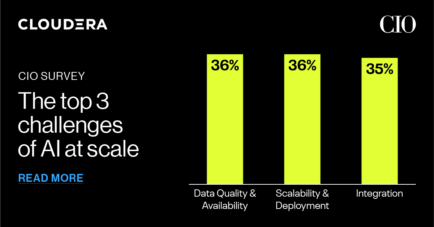At a time when AI is exploding in popularity and finding its way into nearly every facet of business operations, data has arguably never been more valuable. More recently, that value has been made clear by the emergence of AI-powered technologies like generative AI (GenAI) and the use of Large Language Models (LLMs). But, even with the backdrop of an AI-dominated future, many organizations still find themselves struggling with everything from managing data volumes and complexity to security concerns to rapidly proliferating data silos and governance challenges.
As organizations continue to navigate this AI-driven world, we set out to understand the strategies and emerging data architectures that are defining the future. To do this, Cloudera commissioned a study with Foundry, Data Architecture and Strategy in the AI Era, surveying over 600 IT decision-makers in North America, northern Europe region of EMEA, and APAC.
Let’s explore some of the most important findings that the survey uncovered.
Tapping into AI’s Full Potential
 It’s not just hype and talk when it comes to AI—a majority of surveyed respondents (three out of five) said their organizations were at least in the early stages of adopting AI in their operations while only eight percent said they had yet to make any plans for AI adoption. And of those organizations working on some stage of AI adoption, a few of the top benefits included increased productivity (35%), enhanced operational efficiency (33%), improved customer experience (33%), and optimized supply chain and logistics (33%).
It’s not just hype and talk when it comes to AI—a majority of surveyed respondents (three out of five) said their organizations were at least in the early stages of adopting AI in their operations while only eight percent said they had yet to make any plans for AI adoption. And of those organizations working on some stage of AI adoption, a few of the top benefits included increased productivity (35%), enhanced operational efficiency (33%), improved customer experience (33%), and optimized supply chain and logistics (33%).
The benefits are clear, and there’s plenty of potential that comes with AI adoption. But that doesn’t mean it’s all smooth sailing for organizations putting AI into practice. Among the most common challenges to achieving AI adoption at scale were data quality and availability (36%), scalability and deployment (36%), integration with existing systems and processes (35%), and change management and organizational culture (34%). Ultimately, when it comes to reaching the full potential of AI, the organizations that are able to overcome these complexities and find, classify, and expose data to the right people will be able to find sustained success at scale.
Mapping Out the Keys to Success
The path to successfully implementing AI at enterprise scale is built on three critical elements: modern data architecture, unified data management, and versatile, secure data platforms. Of surveyed respondents, companies that are leading the way toward AI adoption are focusing on these three areas.
- Modern data architecture: A flexible approach is critical for building a modern architecture, with IT leaders recognizing the importance of data lakes or lakehouses for managing the large volumes of unstructured and semistructured data required for AI model training. In fact, two thirds of respondents agreed that data lakehouses were crucial to reducing pipeline complexity.
- Unified data management: Survey respondents overwhelmingly (90%) understood the importance of unifying their data lifecycle on a single platform as an essential part of analytics and AI. And nearly half (46%) of surveyed IT leaders said their organization interacts with every stage of the data lifecycle process. Gaining complete control and visibility into every aspect of data gives IT leaders the capabilities needed to drive AI-fueled innovation.
- Flexible, secure data platforms: From a long-term perspective, a hybrid data management approach, including both on-prem and public cloud infrastructure and data strategy, is the preferred path forward. While only one third of respondents currently deploy multicloud or hybrid data architectures, 93% of those respondents agreed that “multicloud and hybrid capabilities for data and analytics are key for an organization to adapt to change.”
The potential of AI is massive and is quickly moving from the theoretical into actual implementation across a vast number of businesses. And as it does, having a modern data architecture is proving to be a critical, foundational, part of successfully scaling the technology and reaching its full potential—something that the survey results reveal and that IT leaders are acutely aware of within their own organizations. Ultimately the organizations that successfully implement AI will be those that are able to demonstrate high levels of confidence in training data, model integrity, and respect for security and privacy.
Check out the full survey report for additional insights into the future of AI and data architecture.



